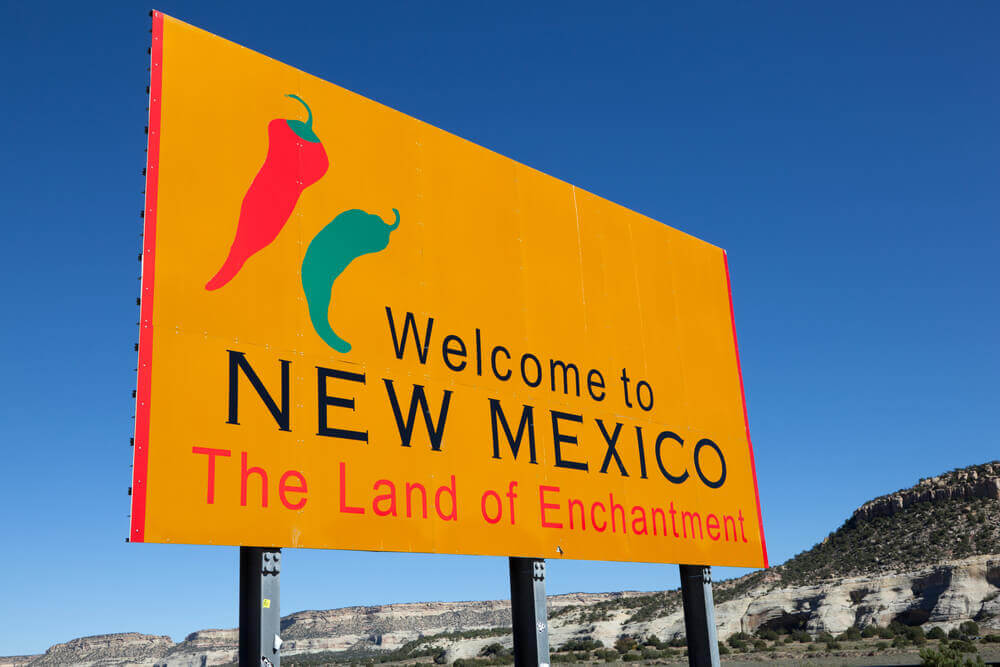New Mexico Expat Tax Requirements: Do I Still Need to File?

New Mexico collects $5,179 per capita in state and local taxes, ranking 31st nationally in terms of tax competitiveness. But here’s what many expats discover too late – New Mexico is one of the most aggressive states in pursuing former residents for taxes, even years after they’ve moved abroad.
Yes, you likely still need to file New Mexico tax returns if you previously lived there, unless you’ve taken specific steps to prove you’ve completely severed ties with the state. New Mexico uses both a domicile test AND a physical presence test, making it one of the stickiest states for expat taxation.
The good news? While New Mexico is aggressive about maintaining jurisdiction, most expats can resolve their obligations without devastating financial consequences when they take the right approach. Whether you’re behind on filing, recently moved abroad, or just discovered your New Mexico obligations, you can achieve peace of mind with a clear strategy and proper execution.
Am I Still Considered a New Mexico Resident for Tax Purposes?
New Mexico uses two different tests to determine residency, and meeting either one makes you a resident subject to worldwide income taxation.
- Domicile Test: If New Mexico was your permanent legal home – the place you intended to return to indefinitely – you remain a New Mexico resident until you establish domicile elsewhere and abandon your New Mexico domicile.
- Physical Presence Test: If you were physically present in New Mexico for 185 days or more during any tax year, you’re considered a resident for that entire year, regardless of where your domicile is located.
Here’s the challenging part: New Mexico is notorious for arguing that moves abroad are “temporary” unless you can prove otherwise with overwhelming evidence. They actively pursue former residents and use sophisticated methods to maintain tax jurisdiction.
If you’ve spent significant time in New Mexico in recent years OR maintained any New Mexico connections (property, bank accounts, driver’s license, etc.), New Mexico likely still considers you a resident.
What’s the 185-Day Rule and How Does It Affect Expats?
New Mexico’s 185-day physical presence test catches many expats off guard. You’re considered a New Mexico resident for the entire year if you spent 185 full days (about 6 months) in the state during any tax year.
What counts as a “day”:
- Any 24-hour period spent in New Mexico
- Days don’t need to be consecutive
- Partial days (like flying through Albuquerque) don’t count
- Working in New Mexico during the day but sleeping elsewhere doesn’t count
Real example: Jessica worked on a project in Santa Fe for 7 months in 2023, but lived in Texas. Since she spent more than 185 days physically present in New Mexico, she became a New Mexico resident for the entire year 2023. She therefore owed tax on her worldwide income, including her salary from Texas.
If you spent a significant amount of time in New Mexico before moving abroad, you may have triggered residency in your departure year. This means filing as a part-year resident and potentially owing tax on worldwide income for that period.
How Do I Prove I’ve Abandoned New Mexico State Domicile?
New Mexico makes it notoriously tricky to abandon residency. They look for any evidence that you maintain ties to the state or intend to return.
Connections that hurt your case:
- Current New Mexico driver’s license or ID card
- Vehicle registration in New Mexico
- Voter registration in New Mexico
- Bank accounts, investment accounts, or credit cards with New Mexico addresses
- Property ownership in New Mexico (even if rented out)
- New Mexico business interests or professional licenses
- Spouse or children living in New Mexico
- Using New Mexico addresses for mail (even friends’ or relatives’)
Evidence that helps establish abandonment:
- Selling all New Mexico property or converting to arm’s-length rental arrangements
- Closing all New Mexico financial accounts
- Canceling New Mexico driver’s license and voter registration
- Obtaining a driver’s license and registering to vote in a new location
- Establishing permanent housing abroad with a long-term lease or purchase
- Moving immediate family members abroad
- Obtaining work visas or permanent residence status abroad
Some expats find it easier to establish residency in a tax-free state like Texas or Florida before moving abroad, rather than trying to abandon New Mexico residency from overseas.
Success story: Robert relocated from Albuquerque to Germany, but initially retained his New Mexico driver’s license and bank account. New Mexico continued taxing his worldwide income for three years. After systematic planning, he properly abandoned his New Mexico domicile, closed all accounts, sold his property, and established clear evidence of permanent German residence. His annual New Mexico tax dropped from $8,400 to $0.
What If I Have New Mexico Income But Live Abroad?
Even if you successfully establish non-resident status, you may still need to file New Mexico returns for income earned from New Mexico sources.
New Mexico-source income requiring non-resident filing:
- Wages, salary, or benefits from New Mexico businesses
- Self-employment income for services performed in New Mexico
- Rental income from New Mexico property
- Business income from New Mexico partnerships or S corporations
- Royalties from New Mexico-based intellectual property
- Income from New Mexico business interests
Example calculation: Maria, who lives in Spain, owns a rental property in Taos that generates an annual net income of $12,000. As a non-resident, she pays New Mexico tax only on this $12,000, not her Spanish salary. Her New Mexico tax: approximately $600 annually.
Important exceptions:
- Investment income from New Mexico sources generally doesn’t require filing unless you’re actively involved in a New Mexico business
- Pension distributions from New Mexico sources only require reporting if you have other New Mexico income
- Even if required to report pension income, federal law prohibits states from taxing non-resident pensions
What Should I Do If I’m Behind on New Mexico State Filing?
Don’t panic if you’ve been living abroad without filing New Mexico returns. Most expats in similar situations resolve their compliance issues through strategic planning rather than facing catastrophic financial consequences.
Step 1: Assess Your Residency Status
Determine whether New Mexico considers you a resident based on domicile and physical presence tests. Many expats discover that they can establish non-resident status for some or all of the years in question.
Step 2: Calculate Potential Exposure
New Mexico tax rates range from 1.7% to 5.9% for 2024, which is relatively moderate. The bigger concern is often penalties and interest on unfiled returns.
Step 3: Consider Streamlined Filing
If your failure to file was non-willful (you didn’t know about the requirement), you may qualify for the IRS Streamlined Filing Compliance Procedures. This addresses federal obligations and provides a foundation for state compliance.
Step 4: New Mexico Voluntary Disclosure
New Mexico offers voluntary disclosure programs that can significantly reduce penalties compared to waiting for the state to find you. The key is coming forward proactively.
Step 5: Establish Going-Forward Strategy
Once current, implement a plan to minimize future obligations through precise non-residency or strategic compliance planning.
Success story: Carlos lived in Costa Rica for five years without filing New Mexico returns, thinking his move ended his obligations. He owed an estimated $19,000 in taxes and penalties. Through voluntary disclosure and proving non-resident status for the last three years, we reduced his liability to $7,200 and established a clear path forward.
How Can I Minimize My New Mexico State Tax Obligations?
Strategy 1: Establish Clear Non-Residency
The most effective approach is proving you’ve completely abandoned New Mexico domicile:
- Systematically sever all New Mexico ties before or immediately after moving abroad
- Document your permanent move with employment contracts, housing arrangements, and family relocation
- Avoid any activities that suggest you intend to return to New Mexico
Strategy 2: Alternative State Residency
Consider establishing residency in a no-income-tax state before moving abroad:
- States like Texas, Florida, Nevada, or Wyoming don’t impose income taxes
- This requires genuine relocation and establishment of ties, not just a mailing address
- Much easier than trying to abandon New Mexico residency from overseas
Strategy 3: Manage Physical Presence Carefully
If you visit the US, carefully track your time in New Mexico:
- Avoid spending 185+ days in New Mexico in any tax year
- Keep detailed travel records to prove compliance
- Consider visiting other states instead if you have flexibility
Strategy 4: Optimize New Mexico-Source Income
If you maintain New Mexico rental property or business interests:
- Structure activities to minimize taxable income
- Consider professional management to reduce personal involvement
- Plan for eventual disposition of New Mexico assets
Will Federal Expat Tax Benefits Help with New Mexico?
Federal expat tax benefits provide some relief but don’t eliminate New Mexico obligations entirely.
- Foreign Earned Income Exclusion (FEIE): For 2025, you can exclude up to $130,000 in foreign earned income from federal taxes. New Mexico partially conforms to federal treatment, so this may reduce your New Mexico taxable income if you qualify.
- Foreign Tax Credit (FTC): This provides a dollar-for-dollar credit for foreign taxes paid against your federal liability. New Mexico doesn’t allow credits for foreign taxes paid, so this doesn’t directly help with state obligations.
Example: David earns $75,000 in Australia and pays $22,000 in Australian taxes. For federal purposes, he excludes his entire salary and owes $0. For New Mexico (if he’s still considered a resident), he reports the $75,000 with no credit for Australian taxes paid, owing approximately $3,750 in New Mexico tax.
This demonstrates why establishing non-resident status is crucial for New Mexico expats.
When Should I Get Professional Help?
Consider professional assistance if you:
- Spent significant time in New Mexico before moving abroad (approaching 185 days)
- Own New Mexico property or maintain business interests there
- Have been living abroad without filing New Mexico returns for multiple years
- Are uncertain about your residency status under New Mexico’s complex rules
- Face New Mexico tax assessments, audits, or collection actions
- Want to establish a proactive strategy for minimizing future obligations
New Mexico’s aggressive pursuit of former residents and complex residency tests make professional guidance particularly valuable. Our state tax specialists regularly assist expats in resolving multi-year New Mexico compliance issues and establishing strategies that provide long-term peace of mind.
What’s My Next Step?
- If you’re currently on New Mexico filing status: Review your residency status and consider whether you can establish non-residency through changing your state residency while abroad or systematic tie-cutting.
- If you’re behind on filing: Don’t wait for New Mexico to contact you. Their pursuit of former residents is aggressive, and penalties accumulate quickly. Start by assessing your exposure and considering voluntary disclosure options.
- If you’re unsure about your status: Get clarity now rather than hoping for the best. New Mexico’s complex rules and aggressive enforcement make professional assessment particularly valuable.
- If you’re planning to move abroad: Take steps to establish clear non-residency before you leave, ideally by establishing residency in a no-income-tax state first.
No matter how late, messy, or complex your New Mexico tax situation may be, we can help. You’ll have peace of mind, knowing that your taxes were done right.
If you’re ready to be matched with a Greenback accountant, click the get started button below. For general questions on expat taxes or working with Greenback, contact our Customer Champions.
Whether you’re years behind or just unsure about the thresholds, our team is ready to help.
This article is for informational purposes only and should not be considered legal or tax advice. Tax laws are complex and subject to change. Individual situations vary, and you should consult with qualified professionals for guidance specific to your circumstances.


